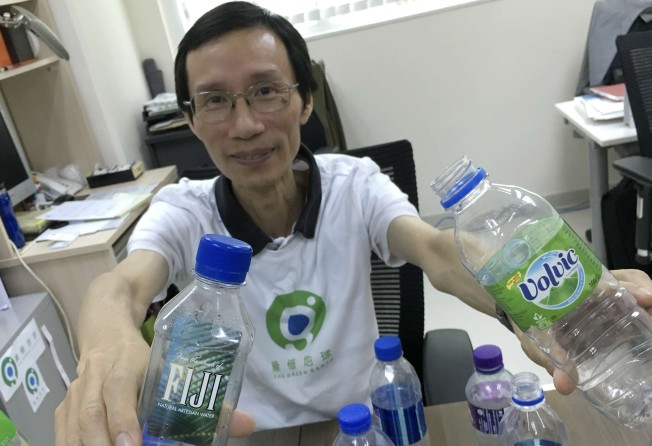Super profits: Hong Kong bottled water producers accused of reaping big money while adding heavily to plastic bottle waste
Green group says the government should increase water tariffs for commercial users to bring them in line with production costs

Taxpayers are subsidising bottled water producers and enabling them to reap “super profits” while contributing heavily to the plastic bottle waste crisis.
Environmental group Green Earth is making a plea to residents to reduce consumption of bottled water and their overall “water footprint”.
Water tariffs, which are heavily subsidised, have remained frozen for two decades. The current rate for commercial users of using one cubic metre of water is just HK$4.58, which is roughly half of the Water Supplies Department’s production cost.
This means that thanks to taxpayers, a bottler that sells 2,000 500ml bottles of water at HK$4.40 can reap profit margins 1,900 times the original purchasing cost, said group chairman Dr Frederick Lee Yok-shiu.
“It doesn’t make sense for taxpayers to be subsidising these big companies,” said Lee, who heads the University of Hong Kong’s water governance research programme. “They are making super profits ... water is currently very underpriced.”
Lee said the bottled water problem reflected another fundamental problem in the city – tariffs do not reflect the real value of water and are only encouraging wastage. He urged the government to increase them to more appropriate levels of cost recovery.
The group estimates up to 5.2 million polyethylene terephthalate (PET) plastic bottles are disposed of every day in Hong Kong, but in 2014 just 14 per cent were recovered for recycling. The international average is 37 per cent.
Group founder Edwin Lau Che-feng said bottled water manufacturers had a corporate environmental responsibility to help increase the level of recycling in the city given the amount of waste they created.
“The government must begin the groundwork for a plastic bottles producer responsibility scheme (PRS) ,” said Lau.
Such a scheme requires manufacturers, distributors, retailers and consumers to share the responsibility for the collection, recycling, treatment and disposal of products to reduce the environmental impact at the post-consumer stage.
Legislation is in place for plastic bags, certain waste electrical appliances and from 2018 glass beverage containers, thanks to an amendment bill that was finally passed last week. Environment Secretary Wong Kam-sing said waste charging would complement the schemes.
The Environmental Protection Department said it would follow its blueprint and study the feasibility of implementing a PRS for other items between this year and 2018.
But Lau said further delays would only lead to more bottles being dumped in landfills. A coalition of non-profit groups, including Green Earth, has launched a petition to lobby the government to begin preliminary legislative work for what is likely to be a prolonged process in setting up a PRS.
Swire Coca Cola, which bottles Bonaqua, said it was “keen to take part in any policy dialogue with the government and stakeholders over PET bottle waste management”.
Li Ka-shing-owned Watsons Water, which distributes the Watsons and Cool brands, said it “always welcomes practical and effective measures on environmental protection”. Vitasoy, which sells Vita, said it would “pay close attention to the development of government regulations”.
All stressed they were already either using recycled or reduced PET in certain products but when asked by the Post, none of them would disclose their annual bottle production, with one citing “commercial sensitivity”.